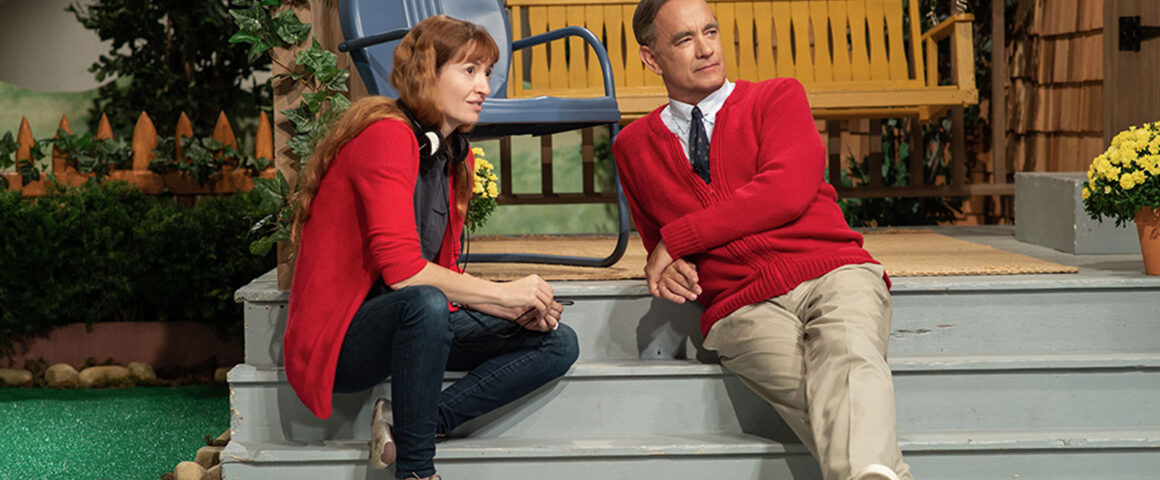“Everyone has lots of ways of feeling. And all of those feelings are fine. It’s what we do with our feelings that matter in this life.” — Fred Rogers
Loosely based on Tom Junod’s 1998 Esquire article on children’s television personality Fred Rogers, “Can You Say . . . Hero?,” Marielle Heller’s (“Can You Ever Forgive Me?”) bittersweet A Beautiful Day in the Neighborhood is a potent antidote to the widespread cynicism that pervades our culture of scientifically-sanctioned meaninglessness. Known as Mr. Rogers, he was a TV icon for more than half a century who sang, played with puppets and personified the ideals of generosity, kindness, and compassion to millions of children throughout the world. The film, while not a traditional biopic, looks at Mr. Rogers (Tom Hanks, “Sully”) through the eyes of investigative reporter Lloyd Vogel (Matthew Rhys, “The Post”), a pull-no-punches journalist assigned to write an article about him, a man whose life unfortunately is consumed with bitterness.
According to the director, “There was something about working on this movie that made me see it as a gift. Fred felt the suffering of other people and the world really deeply, and it led him to do the work that he did.” Though the film is basically a true to life portrayal of Mr. Rogers, screenwriters Micah Fitzerman-Blue and Noah Harpster introduce a conflict between Vogel and his alcoholic dad (Chris Cooper, “Live by Night”) to emphasize the point that failing to communicate and suppressing anger is self-defeating. Though Tom Hanks is basically relegated to a supporting role, he is still the movie’s brightest light and the film loses some of its luster when he is not on the screen.
A Beautiful Day in the Neighborhood opens in a setting familiar to TV viewers of his show. Looking directly at the camera in his neatly constructed TV house, Mr. Rogers sings his theme song, puts on his trademark red sweater and sneakers and tells us in a soft, unhurried, almost soporific tone, about a friend of his, Lloyd Vogel, who is going through a difficult period in his life. We first encounter Vogel’s dysfunctional relationship with his father at the wedding of Lloyd’s sister (Tammy Blanchard, “Rabbit Hole”) when, after some awkward attempts at conversation, they come to blows. It is only later that we find out that Vogel holds his father responsible for abandoning the family when his mother was dying.
Assigned by his editor (Christine Lahti, “Touched With Fire”) to write a flattering 400 word article on Mr. Rogers, what is known in the trade as a “puff piece,” Vogel, who has a reputation for taking people apart and forgetting to put them back together, is at first deeply skeptical of the reality of Rogers’ reputation but agrees to the assignment. Angry and resentful, his barely suppressed feelings towards his father create tension in his marriage to his wife Andrea (Susan Kelechi Watson, “This Is Us” TV series) and his infant son. When he tells Andrea that he is going to write about Mr. Rogers, knowing his reputation for cynicism, she warns him with tongue-in-cheek not to “ruin her childhood.”
When Vogel first meets Fred in a Pittsburgh studio, he expects a quick conversation and a respite from the tensions at home, but is taken aback when Rogers asks him about the wound on his face. Reluctant at first to talk about himself, through Rogers’ persistence, he allows Lloyd to begin to express his feelings of abandonment, telling him that it is okay to be angry and that he knows it is very hard to forgive someone we love. One of the most moving scenes in the film takes place in a restaurant where, during a conversation, Fred asks Vogel to pause for a minute and remember the people in his life who loved him.
The minute of complete silence captures the essence of the man and reminded me of the power of Emma Gonzales who, at the 2018 March for Our Lives demonstration, after naming the seventeen victims of the Parkland high school shooting, stood silently for over four minutes, before ending her speech saying, “Fight for your lives before it’s someone else’s job.” Despite all efforts to avoid it, however, the ubiquitous Mister Rogers comes across as somewhat larger than life, a man whose only negative character trait seems to be banging on the lower register of the piano to express his feelings, but it is Hanks projection of sincerity and caring that wins us over.
While the emotional release the director may have intended is somewhat thwarted by the unlikeability of Vogel’s character, A Beautiful Day in the Neighborhood is still a timely and resonant film that is touching and heartfelt without being manipulative (except for a contrived scene on a subway train where passengers burst out singing Rogers’ theme song). To put an exclamation point on the film’s relevance, Heller says, “The world is in need of kindness right now. I think we all feel that . . . at this moment in my life, at this moment politically, I wanted to make a movie about a person who truly embodies deep thinking, compassion and inclusivity. And Fred Rogers was that person. He dedicated his life to small genuine acts of compassion, and this movie shows how those small acts can change the lives of people around us.” It does indeed.




'Movie Review: A Beautiful Day in the Neighborhood (2019)' has no comments